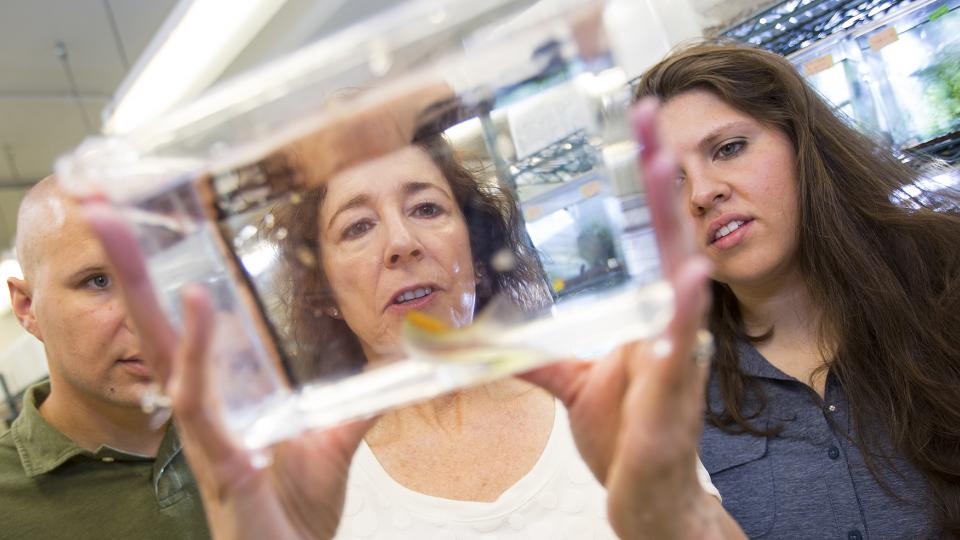
For more than 20 years, Alexandra Basolo has been a willing teacher and mentor to hundreds of students, and her efforts were recognized when she earned the 2014 Distinguished Teaching Award from the Animal Behavior Society.
The award is a career honor given periodically by the society and rewards faculty who have "demonstrated a sustained record of highly effective and innovative teaching in the classroom or in an informal education setting."
Basolo received the award at the annual Animal Behavior Society conference at Princeton University in Princeton, N.J., in August.
Basolo, a professor of biological sciences and psychology, has spent much of her career researching evolutionary, behavioral and ecological processes that influence traits in animals, focusing on a group of freshwater, fishes found primarily in the U.S. and Central America. She incorporates her research in the classroom, using videos from the field and UNL lab to demonstrate different aspects of animal research.
One video was taken in Belize in 1998 and shows a family of parental cichlid fish protecting their young while on foraging forays. The parents were seen frenetically dashing about, heading off would-be predators angling for their young. The video is an example of anti-predator behavior in the wild, which Basolo has adapted as a learning module for the classroom. Using a score sheet, students quantify anti-predator behavior from the video, and even at half-speed, this is a challenge.
“It helps them learn just how difficult it is to do field work,” she said.
Basolo shares her teaching materials with faculty at other institutions and uses them for outreach programs. She is also developing learning exercises that teachers can use in high school and college classrooms. She has seen first-hand where these types of real-world examples would be useful.
“Most of the students at my table (at the Women in Science convention for high school students) were doing remote learning, and I didn’t realize this occurred in Nebraska,” Basolo said. "It made me want to develop learning modules that students could access remotely, and perhaps even communicate with one another about what they learned."
Basolo served on the UNL ADVANCE committee, with a goal of helping women succeed in science-related careers, something she’s always felt important to do.
“If they have an interest and can find a woman as a mentor, they seem to stick around,” she said.
Basolo is compiling tools for teachers and faculty, and building a website where learning exercises and resources can be accessed. In the meantime, she’s busy with her research, teaching, mentoring and outreach.
Thus far at UNL, she has mentored more than 100 undergraduates in her lab. She also enjoys outreach activities and working with budding scientists, adapting her research for all ages.
“I’ve done everything from being shadowed by high school and middle school students, to working with young children at the Henry Doorly Zoo,” Basolo said.
In the last three years, she has developed outreach activities at the Henry Doorly Zoo, Wonderlab Event in Bloomington, Ind., the Colorado Museum of Natural History in Denver, and Princeton University.
In addition to the DNA Day Event at the Henry Doorly Zoo in 2011, in the past three years she has developed outreach activities for a Wonderlab Event in Bloomington, IN, an outreach event at the Colorado Museum of Natural History, and an “Adventures in Animal Behavior” event at Princeton University. She also assists the Center for Science, Mathematics and Computer Education with the Women in Science Conference.
Her mentorship was highlighted in a nomination letter from David Orange of California State University, Sacramento, who worked in Basolo's lab as an undergraduate. In the letter, Orange described Basolo as an outstanding teacher and mentor.
“I consider Dr. Alexandra Basolo an innovative scientist and a dedicated and passionate teacher,” Orange wrote. “Not only does she inspire her students to achieve more, she is also a leader in providing state of the art teaching materials that others can also use to motivate and engage their students.”
Written by: Deann Gayman, University Communications